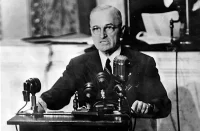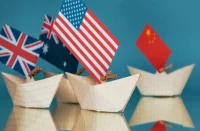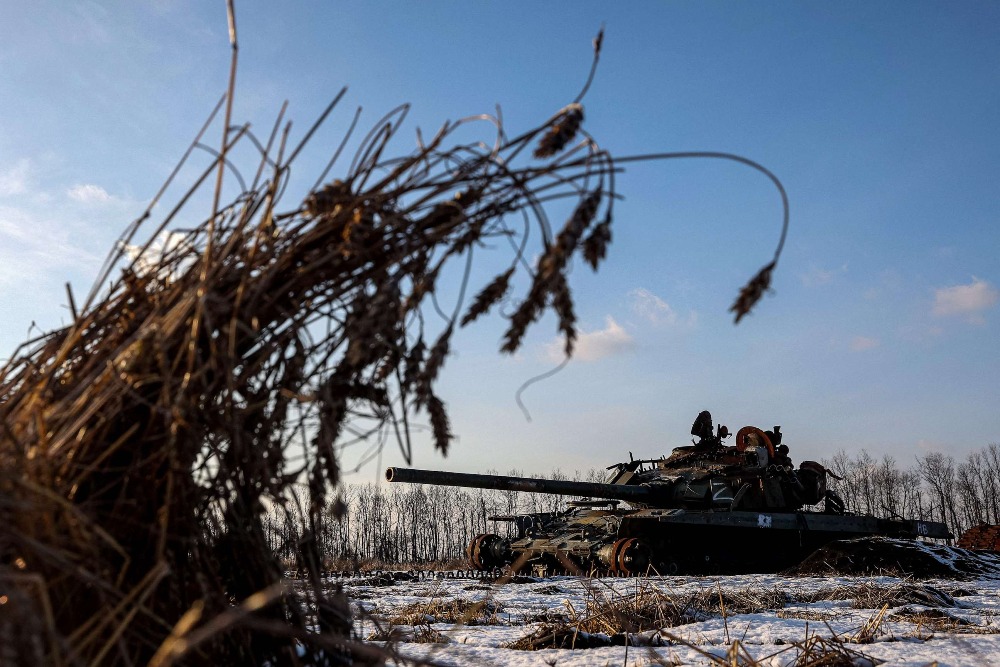Modern-day military-political alliances and coalitions as analogues of empires
The rebirth of imperial policy in modern international life demands an answer to the question: why are seemingly long obsolete geopolitical projects being dragged into the light of day at all when there are organisations like NATO and the European Union?
In many ways, the North Atlantic Alliance bore the features of imperial ambition from its very beginnings. NATO is like a quasi-empire safeguarding its own expansion and aiming for «immortality», which was particularly obvious following the dissolution of the Warsaw Treaty Organisation in 1991. The imperial sense of the alliance is also revealed by the fact that its European component is based on the tradition of the Charlemagne Empire. (1) Many academics in the West believe that NATO’s original political and cultural role as «the institutional cement of what people began calling Atlantic civilisation» was more important than its military function. (2) In reality, however, the alliance served as «a cloak for American interests that had nothing to do with deterring a mythical Soviet threat and more to do with protecting American investments and hegemony». (3)
Benjamin Schwarz, an analyst at the RAND Corporation, believes that America’s economic interests, which predetermined the imperial nature of America’s foreign policy, were the initial cause of the beginning of the «Cold War» and the emergence of alliances like NATO. The aims of this policy had little in common with holding back the «Soviet threat»; the real aims were the «survival and prosperity» of America, regardless of where the threat was coming from or whether it existed at all. «Alliances were being formed at a time when, in reality, American government officials were not thinking about the possibility of Soviet aggression». (4) American academic Joseph Lepgold has observed that NATO is currently an alliance «that nobody will stand up to», a situation which he finds «historically, as well as logically, abnormal». (5)
At first glance, a mechanism as powerful as NATO should be more than enough to respond to any future challenges. In reality, however, the mechanism has become too unwieldy, tangled up with conventions and legal acts of the past. The need for a consensus among all members of the alliance makes it difficult to make decisions quickly. After Iraq and Afghanistan, many influential NATO members did not even want to hear about new ventures. Without nourishment from America and constant interference and pressure from Washington, the cogs of this machine would turn with enormous difficulty.
NATO’s area of responsibility, according to Article 6 of the agreement on its creation, is restricted to the North Atlantic, incorporating Europe, North America and «islands in the North Atlantic area situated to the north of the tropic of Cancer». Article 5, meanwhile, proposes the use of military force by the coalition only if the borders of one of its members are violated. Nevertheless, NATO has tried to give itself the character of a world organisation, sporadically exceeding the limits of its charter. For example, during the civil war in Yugoslavia, the alliance actively interfered in the course of events on the grounds that borders had been violated, while violence and ethnic cleansing were threatening the safety of neighbouring NATO countries. However, as Jonathan Clarke, foreign affairs scholar with the Cato Institute and columnist for the Los Angeles Times, points out, with such justification, it would have been more logical if NATO had not come out on the side of the separatists in 1991, «but rather on the side of the federal government of Yugoslavia». (6)
Of course, constantly violating one’s own legally established norms is a problem. Giving NATO the function of «global gendarme in the service of the UN» did not work out either due to a lack of enthusiasm on the issue from many of the alliance’s members, as well as opposition from China, India, Russia and a number of other powers. For these same reasons, neither did anything come of the plans to extend NATO to the Asia-Pacific Region with the involvement of Japan, South Korea, Australia and New Zealand. The undertaking proved to be too global.
Many believe that NATO has entered a stage of entropy, artificially extending its existence at the expense of welcoming in new members. Strictly speaking, demand for the alliance fell away back when the Warsaw Pact collapsed… Bearing in mind the sense of Article 5 on mutual defence and Article 6 on NATO’s boundaries of responsibilities, the alliance was no longer facing any kind of threat. Discourse about new threats – terrorism, drug trafficking, cybercrime, which NATO is allegedly needed to combat – sounds anecdotal, inasmuch as it has nothing to do with the problems and coalition mechanism.
The North Atlantic Alliance is not just turning into an atavism, it is diverting America’s resources from a new centre of 21st century world politics and this is moving over to the Asia-Pacific Region, where the NATO Empire cannot reach. Nevertheless, the USA cannot give up NATO completely: bastions once created in the Old World must remain there. At the same time, America needs a free hand in the East and it needs more reliable schemes of influence in world politics, hence the need for new alliances and empires. The only way to instil enthusiasm in European allies is by appealing to their own interests and their nostalgia for former greatness. This is why the imperial mechanisms tried and tested for centuries are turning out to be more useful than the bulky control mechanisms of modern-day coalitions.
The USA is also getting support in Europe from the European Union, and relations between the two are being developed even more intricately. On the one hand, it is strengthening economic integration between America and Europe, and this is a call of the times: withstanding competition from China and other «emerging economies» is becoming more and more difficult. The USA and the EU are intending to create a Transatlantic Free Trade Area (TAFTA) by the end of 2014. As the former US Ambassador to the EU, Boyden Gray, observed, the proposed agreement between the EU and the USA is akin to the creation of an «economic NATO». On the other hand, Washington’s vigilance with regard to the political and particularly military aspect of the European Union remains, especially when America’s power is weakening and the EU might change from wingman to pilot within the Western coalition.
Former US National Security Advisor to the President, Brent Scowcroft, pointed out that the unification of Europe would cause a certain amount of wariness in Americans. «In many respects, we would prefer to deal with Great Britain, France, Germany and others individually», Scowcroft admitted. Zbigniew Brzezinski, meanwhile, complaining that the Europeans are lagging behind the Americans in assuming greater responsibility for the state of the world, has highlighted those who, in his opinion, are mature enough already. According to Brzezinski, «the British» are ready, «the French are more and more ready, and certain allied nations a little less so, for example the Polish and the Dutch. The real problems will be with Germany and, probably, with Italy». It is interesting that new imperial construction in Europe is progressing in direct correlation with this list.
Building coalitions is always difficult. Even Clausewitz, in his book «On War», commented on the self-interest of coalition members. The process of forming coalitions whose members regard future opponents completely differently is often reminiscent of accomplishing «business deals», writes Clausewitz. This is exactly the situation that the Americans faced in Iraq and Afghanistan when, at best, allied support units only protected themselves and, at worst, US subdivisions also had to protect them. The English stood apart from the rest, perhaps, but that is already a different – Anglo-Saxon – coalition within a coalition.
In his work «Strategy», outstanding Russian military theorist A.A. Svechin observed that since Clausewitz’s time, military alliances in the 20th century have become less fragile. «Nowadays, an ally is raised and nurtured for many years before war breaks out», while economically weaker states turn out to be dependent on the financial capabilities of other allies. Svechin also stresses that «despite the growing political durability of modern-day coalitions, they have less power than the sum of their parts. Even with the complete sincerity of the state governments entering into the alliance, each one is unable to relinquish its own particular aspirations, needs and characteristics without causing the most terrible damage to its own statehood». When fighting a war, for example, a small state is only of value if it unreservedly places its own army under the command of a greater power. «Generally speaking, a small ally acting independently and using its own army to pursue particular objectives threatens to bring more drawbacks than benefits».
The whole experience of the USA’s cooperation with its allies in recent decades supports the views of these two military theorists. With this in mind, the fact that the French were given carte blanche to carry out independent operations in Africa on the basis of realising France’s own interests would appear to be a rather encouraging experience for Washington.
NOTES:
(1) Gress David “From Plato to NATO: the idea of the West and its opponents”, The Free Press, N.-Y. 1998, p. 432
(2) Gress David “From Plato to NATO: the idea of the West and its opponents”, The Free Press, N.-Y. 1998, p.423
(3) Ibid. p. 422
(4) Тhe Future of NATO, ed. by Ted Gallen Carpenter, London.: Frank Cass, 1995, p.87-88
(5) Тhe Future of NATO, ed. by Ted Gallen Carpenter, London.: Frank Cass, 1995, p.7
(6) Ibid. p.50
Source: Strategic Culture Foundation














Pingback: NATO Wants To Become The Atlantic-Pacific Alliance – OrientalReview.org – DE LA GRANDE VADROUILLE A LA LONGUE MARGE